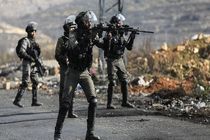Yemeni forces targeted Israeli-linked ship
an Israeli-linked ship targeted by Yemen's Ansarullah forces.

MojNews-Yemeni forced informed of the implementation of a miilitary operaion against an Israeli-linked ship.
The Norwegian-flagged tanker was hit by an anti-ship missile near the crucial Bab el-Mandeb Strait.
The complex aerial attack caused a fire onboard the tanker, which was sailing under the Norwegian flag. No casualties have been reported.
A statement by the official spokesman for Ansarullah's Armed Forces, Brigadier General Yahya Sare'e, said that "the naval forces of the Yemeni Armed Forces carried out a qualitative military operation against the Norwegian commercial tanker STRINDA which was loaded with oil and headed to the Israeli entity, and it was targeted with an appropriate naval missile."
He stressed that the operation came as "a victory” for the Palestinian people “who are currently being subjected to killing, destruction and siege in the Gaza Strip, and in response to the calls of the free people of our great Yemeni people and the people of our region."
It comes as more harrowing images emerge of the Israeli military killing Palestinian babies. To cite an example, the grandmother of Palestinian baby Idres al-Dbari, who was born after the Israeli war on Gaza, mourns over the body of the baby and his mother.
Sare'e pointed out that the Yemeni armed forces succeeded during the past two days in preventing the passage of several ships that failed to respond to the warnings of the Yemeni naval forces and they targeted the Norwegian oil tanker with a cruise missile only after its crew rejected all warning calls.
He stressed that "the Yemeni Armed Forces will not hesitate to target any ship that violates what was stated in the previous statements," adding, "the Yemeni Armed Forces confirm that they will continue to prevent all ships of all nationalities heading to Israeli ports from navigating in the Red and Arab Seas until our steadfast brothers in the Gaza Strip receive food and medicine."
Ansarullah's Armed Forces had announced on Dec. 2 that they will prevent the passage of ships heading to Israel regardless of their nationality, if the food, medicine and other vital supplies do not enter the Gaza Strip.
Ansarullah leaders explained that this decision came as a result of the Israeli regime's ongoing "horrific massacres, genocidal war and siege against the Gaza Strip".
The government in the Yemeni capital Sana'a said any ship heading to Israel would be considered a legitimate target for its armed forces, warning all ships and companies against dealing with Israeli ports.
The armed forces stated that they will implement the decision to prevent the passage of all ships to the occupation regime from the moment the statement was announced at (7pm Saturday, Sana’a time), noting that the decision to prevent the entry of foreign ships towards the Israeli occupied Palestinian territories came after the success in preventing Israeli ships from navigating in the Red and Arab Seas.
The armed forces confirmed that they are keen on the continuation of trade movement for all countries and ships, except for those linked to the Israeli regime or those transporting goods to Israeli ports.
Last month, Yemen announced that it would prevent Israeli-linked ships from navigating in the Red Sea, stressing that it would target all types of vessels that carry the flag of the Zionist entity or are operated by or owned by Israeli companies, calling on all countries around the globe to remove their citizens working as crews linked to the Israeli ships, and to avoid shipping to the regime.
It has carried out the stated mission by targeting certain ships linked to the Israeli regime.
These include the Yemeni forces announcing the seizure of an Israeli ship in a naval military operation on November 19 in the Red Sea.
On December 3, the Yemeni armed forces announced that they had targeted two Israeli ships in Bab al-Mandab after they rejected warning messages from the naval forces.
Israeli economists have revealed that the occupied Israeli port of Umm al-Rashrash, also known as Eilat, had stopped operating as a result of Yemeni threats.
The port authorities reportedly said that Yemen’s threats affect all ships, whether those passing to the Mediterranean Sea or arriving to Umm al-Rashrash (Eilat).
The Zionist regime’s port officials are said to have acknowledged that there are almost no ships docking at the port, indicating that the port intends to take workers out of their jobs and close the port's gates due to lack of trade.
The leader of Ansarallah, Abdul Malik al-Houthi, confirmed in a speech last month that the position of the Yemeni people on the Palestinian issue is firm and honorable, and that he would not hesitate to provide support to the Palestinian people and their resistance.
He stressed that the Yemeni people will spare no effort at a military level with their available means, noting that Ansarallah forces have fired missiles at southern occupied Palestine.
The Ansarullah chief pointed out that “our work on bombing the enemy with missiles and drones will continue, and our planning will continue for additional operations against all the Zionist targets we can achieve in Palestine or outside Palestine."
Yemeni armed forces have highlighted that "our eyes are open to constantly monitor and search for any Israeli ship in the Red Sea, Bab al-Mandab in particular, and what borders Yemeni territorial waters."
It added, "the Israeli enemy's adoption of smuggling and camouflage in the Red Sea is evidence of its fear and evidence of the effectiveness and impact of the position of our country and our people."
Yemen has arguably been the biggest actor outside of the blockaded Gaza Strip and the occupied West Bank to pressure the Israeli regime to halt its merciless war on Palestinian women and children that has even left European nations beginning to question how many Palestinian civilians must be killed as a response to Operation al-Aqsa Storm on October 7.
The decision Yemen has taken to prevent the passage of ships sailing to the Israeli regime and to ban maritime navigation that serves the regime was based on practical implementation and not empty words and statements.
Yemen&#۳۹;s possession of an integrated system of monitoring, tracking, and the ability to implement warnings obliges the regime to take into consideration the warnings of the Yemeni leadership.
The implementation of the decision to ban Israeli and Israeli-linked ships serving the regime involved two levels.
The first was to issue a warning that put the decision into effect.
If the Israeli regime adhered to it, the decision would have not been implemented to prevent Israeli or Israeli-linked ships from navigating in the seas next to Yemen&#۳۹;s waters.
When the party or parties to whom the warning was made insisted on defying it, they were faced with military action.
The Yemeni armed forces adhered to the rules of conflict. They have not attacked any ships directly before issuing multiple warnings. Only after those warnings are ignored, they are targeted.
These warnings are reliable so that ships know that there is an eye monitoring them and they must obey orders to change course.
One of the most important aspects is that Yemen has proved to have an integrated navigation system to monitor and track down ships that defy warnings.
This defense system works in a coordinated manner and essentially puts the decisions of the Yemeni leadership into effect efficiently.
Issuing a warning to ships that violate the Yemeni maritime embargo on the Israeli regime, which is committing daily massacres against women and children before targeting them, shows Yemen respects the laws of the seas.
It also shows Yemen is taking measures in accordance with the stated goal that was declared with proportionality and necessity.
It is the exact opposite of the Israeli regime that declared its stated goal as going after Hamas and bringing back Israeli captives, but has been killing and maiming children.
The Yemeni decision was taken in gradual stages, which also indicates Yemeni intelligence.
Those concerned with the aftermath of this decision may have been surprised by its effectiveness.
The Yemeni decision moved through multiple levels until it reached a level of preventing all naval services to the Israeli regime through the Red Sea, Bab al-Mandab, and the Arabian Sea.
It also demonstrates Yemen’s courage to continue targeting Israeli-linked vessels in the Red Sea and its willingness to accept and deal with any consequences of warnings by the United States.
Passing through the Red Sea and Bab al-Mandab is a strategic need that has a strong impact on the structure of the Israeli economy.
Yemen has made the situation difficult for the Israelis not only from a security aspect but also from an economic and strategic position.
The United States has proposed the establishment of a maritime alliance to protect the navigation of Israeli-linked ships.
Experts believe that this alliance, if established, would be defeated just as Yemen defeated a U.S.-led coalition that waged war against it for eight years.





Add Comment